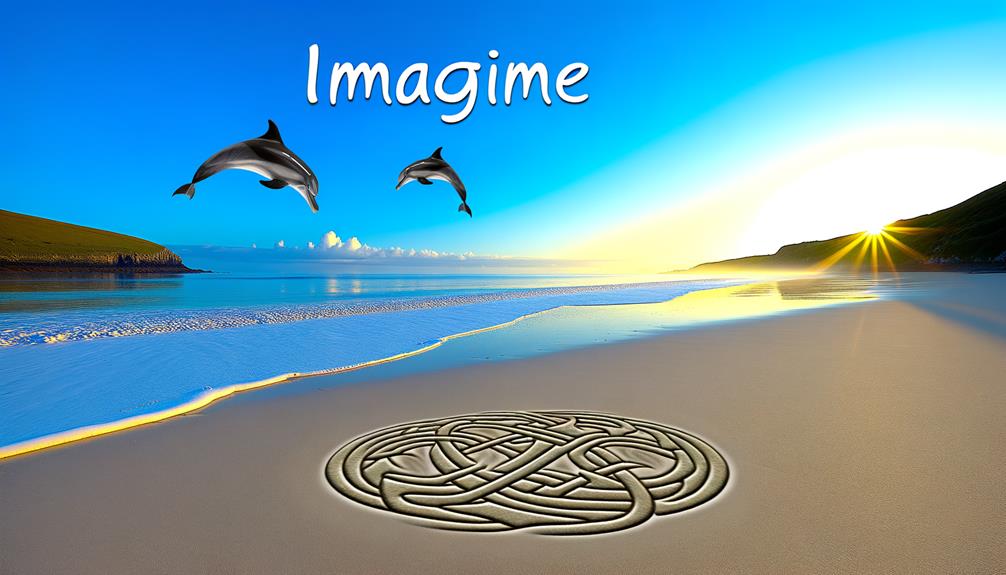Dylan Name Meaning and Origin
Dylan is a name rooted in Welsh mythology and language, translating to 'great tide' or 'son of the sea.' Stemming from tales of Dylan ail Don, a mythological figure linked to the sea, the name evokes Wales' coastal heritage and embodies the vastness and perpetual movement of maritime forces. Linguistically, 'Dy' means 'great' and 'llanw' denotes 'flow' or 'tide.' The name signifies adaptability and resilience, mirroring natural elements.
Its popularity has fluctuated over time, spurred by cultural icons like Dylan Thomas and Bob Dylan. Diverse variations like 'Dillon' and endearing nicknames such as 'Dyl' underscore its broad appeal.
Explore further to uncover its full historical and cultural resonance.

Key Takeaways
- Dylan originates from Welsh mythology, translating to 'great tide' or 'son of the sea.'
- The name Dylan signifies a deep-rooted connection to maritime elements and natural forces.
- Dylan ail Don is a significant figure in Welsh mythology, born from the goddess Arianrhod.
- Influential figures like Dylan Thomas and Bob Dylan have increased the name's recognition.
- Variations include 'Dillan' and 'Dillon,' with nicknames such as 'Dyl' and 'Dilly.'
Welsh Roots of Dylan
The name Dylan originates from Welsh mythology and language, where it holds significant cultural and historical connotations. Derived from the elements 'dy' and 'llanw,' it translates to 'great tide' or 'son of the sea,' reflecting Wales' coastal geography and maritime heritage. Its phonetic harmony and evocative nature have transcended its mythological origins, embedding it into Welsh identity.
The linguistic structure of Dylan showcases the characteristic consonant-vowel patterns prevalent in the Welsh language, emphasizing fluidity and rhythm. This etymology underscores the interplay between language and environment in Welsh culture, illustrating how names can encapsulate regional characteristics.
Dylan in Mythology
In Welsh mythology, Dylan ail Don emerges as a significant figure whose narrative intricately weaves together themes of nature, identity, and destiny. Dylan, born from the goddess Arianrhod, is mythologically associated with the sea. Upon his baptism, he immediately takes to the water, embodying its essence. Tragically, his life is cut short by his uncle Govannon, which only amplifies his mythic resonance. Dylan's tale is not merely a story of an individual but an allegory reflecting human connection with natural elements and the inexorable nature of fate.
| Aspect | Description | Significance |
|---|---|---|
| Parentage | Son of Arianrhod | Divine lineage |
| Element | Sea | Connection to nature's vastness |
| Fatality | Killed by uncle Govannon | Theme of destiny and tragedy |
This mythology underscores the intertwining of human and natural worlds.
Meaning of Dylan
Deriving from the Welsh language, the name Dylan signifies 'son of the sea' or 'born from the ocean,' reflecting its deep-rooted connection to maritime elements and natural forces.
This nomenclature is not merely poetic but also etymologically significant, with 'dy' meaning 'great' and 'llanw' referring to 'flow' or 'tide.' The name encapsulates qualities associated with the sea—vastness, depth, and a sense of perpetual movement.
In Welsh mythology, Dylan ail Don, a deity of the sea, embodies these characteristics, further embedding the name in cultural and historical narratives. This rich etymology suggests a profound affinity with nature, emphasizing traits such as adaptability, resilience, and an intrinsic bond with the natural world, thereby offering a multidimensional understanding of the name Dylan.
Popularity Over Time
Over the years, the name Dylan has experienced fluctuating levels of popularity, influenced by cultural trends, literary figures, and prominent public personalities. Originating from Welsh roots, its widespread recognition can be attributed to notable figures such as poet Dylan Thomas and musician Bob Dylan. Data from various decades illustrate these shifts in popularity.
| Decade | Rank in US | Cultural Influence |
|---|---|---|
| 1960s | 200+ | Bob Dylan's rise |
| 1980s | Top 50 | Growing literary interest |
| 1990s | Top 30 | Popular media references |
| 2000s | Top 20 | Continued media exposure |
| 2010s | Top 30 | Celebrity baby names |
The ebbs and flows in Dylan's popularity reflect its rich cultural and historical significance, making it a timeless choice for many parents.
Dylan in Modern Culture
As Dylan's popularity has fluctuated through the decades, its presence in modern culture continues to be reinforced by its association with influential figures and media representations. Bob Dylan, the iconic singer-songwriter, has significantly contributed to the name's enduring appeal, embedding it within the cultural zeitgeist.
In literature and cinema, characters named Dylan often embody traits of creativity and introspection, further solidifying its cultural resonance. Television series such as 'Beverly Hills, 90210' and 'Modern Family' have popularized the name among younger generations.
Additionally, the name's versatility across gender lines has increased its usage, reflecting broader cultural shifts towards inclusivity. Thus, Dylan remains a salient, dynamic element within contemporary cultural narratives.
Variations and Nicknames
The name Dylan, with its rich linguistic and cultural heritage, has spawned a variety of intriguing variations and affectionate nicknames across different languages and regions.
In its Welsh origin, it is often rendered as "Dylan" without alteration. However, in other linguistic contexts, variations such as "Dillan" and "Dillon" are prevalent. Additionally, regional adaptations include "Dylano" in some Romance languages.
The name also engenders several endearing nicknames, such as “Dyl” and “Dilly,” which emphasize familiarity and affection. These variations and nicknames not only reflect the name’s adaptability but also its widespread acceptance and integration into various cultures. This adaptability allows the name to resonate with people from different backgrounds, making it an inclusive choice for many parents. A frank name definition and significance reveals that names often carry deeper meanings, serving as a connection to heritage and personal identity. The warmth conveyed through these nicknames fosters a sense of belonging, reinforcing the importance of names in our social interactions and relationships.
Such linguistic diversity underscores Dylan's enduring appeal and its capacity to resonate across different demographic and cultural boundaries.
Conclusion
The name Dylan, deeply rooted in Welsh heritage and mythology, signifies 'son of the sea' and has evolved in meaning and popularity over time. Its resonance in modern culture and literature highlights its enduring charm.
Dylan's various iterations and affectionate nicknames reflect its adaptability. As a name that has stood the test of time, Dylan remains a beacon, guiding the way through the ever-changing currents of linguistic and cultural trends.






